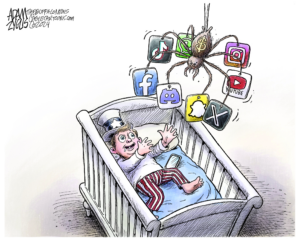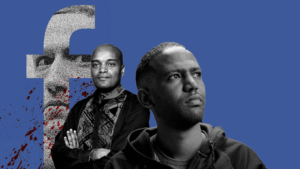Gawker’s Founder Has Doubts About the Facebook Model of Journalism
The man who “has probably done more than any individual to loosen up the mainstream media” is having second thoughts about the click-baiting model of reporting that his media empire helped make standard today. Gawker founder Nick Denton with Huffington Post co-founder Arianna Huffington. (Financial Times / CC BY 2.0)
Gawker founder Nick Denton with Huffington Post co-founder Arianna Huffington. (Financial Times / CC BY 2.0)
The man who “has probably done more than any individual to loosen up the mainstream media” is having second thoughts about the click-baiting, Facebook-optimized model of reporting that his media empire helped make standard today.
In recent months, Gawker founder Nick Denton’s “once-straghtfoward relationship with traffic has grown more complicated,” writes New York Times contributor Jonathan Mahler in a long, considered article. “It seems to have occurred to him that the quest for eyeballs doesn’t always produce the highest-quality content”:
“A lot of our traffic last year came from stories that we weren’t ultimately proud of,” Mr. Denton said. He cited Gawker Media’s biggest traffic sensation in 2014, a video compilation of people messing up the Ice Bucket Challenge that has attracted more than 16 million views. “You’re going to get a spike from a story like that, but at the end of the year, what does it say about your brand, and are you measuring that?” …
Late last year, Mr. Denton put some of his thoughts about the traffic chase into a Jerry Maguire-style memo to his staff. In excess of 4,000 words, it made the case that in its zeal for growth, Gawker had lost sight of its mission to put truths on the Internet. “Editorial traffic was lifted, but often by viral stories that we would rather mock,” he wrote. Above all, he bemoaned his company’s dependence on Facebook, which is responsible for about 25 percent of Gawker’s traffic. “We — the freest journalists on the planet — were slaves to the Facebook algorithm.”
Facebook poses a dilemma for just about every ambitious publisher. All of them are desperate for the traffic that comes with being featured on a social media network with more than a billion users, but at least some are wary of publishing articles on a platform that they don’t control. They fear losing journalistic independence, not to mention ad revenue, and worry about the compromises that might be necessary to ensure that a post is given prominent play in Facebook’s news feed.
Denton was an early believer in Facebook, Mahler writes, pressuring writers to join and promoting stories on his personal page. But now he says he’s changed his mind. “If the newspaper industry wants to give up hundreds of years of passion and history and make themselves slaves to some 20-something in Silicon Valley who did the latest hot social network, well, that’s up to them,” he told Mahler. “We choose not to.”
Mahler continues:
Mr. Denton knows that Facebook is too powerful to ignore completely. He’s not planning to shut down Gawker’s Facebook page, for instance. But he says he will never allow Facebook to host content — something The Times has experimented with — rather than directing readers to a Gawker external site. More generally, he says he will no longer allow Facebook or any other social media site to influence Gawker’s newsroom direction.
To prove the point, Mr. Denton put Mr. Craggs, the former editor of Deadspin and a widely respected journalist, in charge of all news content for Gawker Media. One of Mr. Craggs’s first moves was to change the bonus structure; writers are now rewarded not for clicks, but for what editors judge to be the quality of their posts.
Read more here.
— Posted by Alexander Reed Kelly.
Your support matters…Independent journalism is under threat and overshadowed by heavily funded mainstream media.
You can help level the playing field. Become a member.
Your tax-deductible contribution keeps us digging beneath the headlines to give you thought-provoking, investigative reporting and analysis that unearths what's really happening- without compromise.
Give today to support our courageous, independent journalists.






You need to be a supporter to comment.
There are currently no responses to this article.
Be the first to respond.